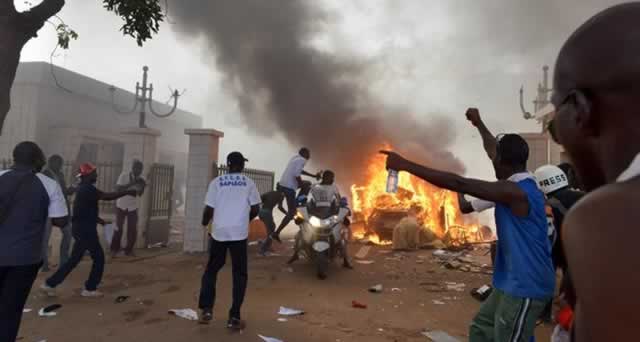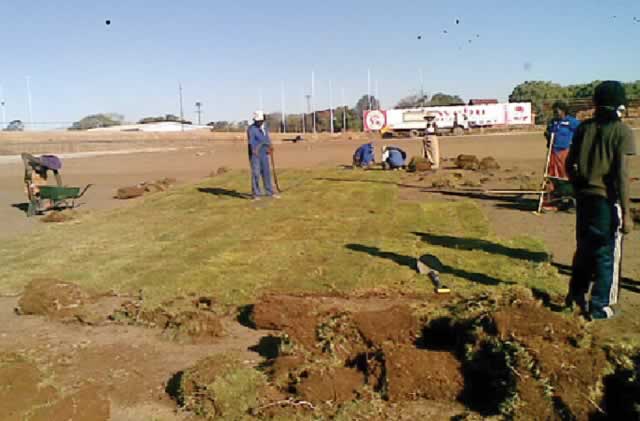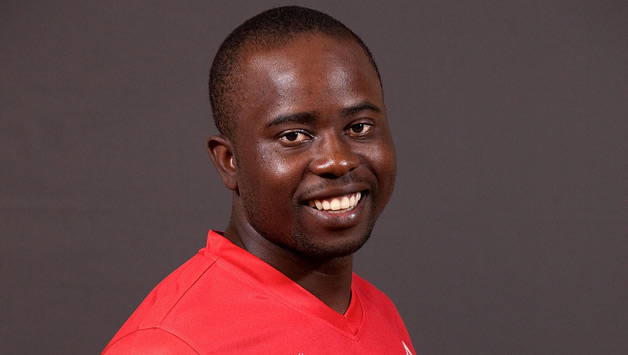Protesters storm Burkina parly ahead of key vote

Ouagadougou — Hundreds of angry demonstrators in Burkina Faso stormed parliament yesterday in protest at plans to change the constitution to allow President Blaise Compaore to extend his 27-year rule.
Police had fired tear gas on protesters to try to prevent them from moving in on the National Assembly building in the capital Ouagadougou ahead of a vote on the controversial legislation.
But about 1,500 people managed to break through the security cordon and were ransacking parliament, according to AFP correspondents.
Protesters ransacked offices, setting fire to documents and stealing computer equipment, and set fire to cars outside.
The country has been tense for days in the run-up to yesterday’s vote over the changes, which the European Union has warned could jeopardise stability in the west African nation.
Police and soldiers were out in force around the parliament after mass rallies called by the opposition earlier this week.
The European Union has urged the government to scrap the legislation, warning that it could “jeopardise . . . stability, equitable development and democratic progress”, and called for all sides to refrain from violence.
Several thousand protesters had marched through the capital on Wednesday, the day after street battles erupted during a mass rally by hundreds of thousands of people against what they see as a constitutional coup by supporters of Compaore.
The legislature is due to examine a proposed amendment that would allow Compaore, now in the 27th year of his presidency, to run for re-election in November next year for another five years.
“October 30 is Burkina Faso’s Black Spring, like the Arab Spring,” said Emile Pargui Pare, an official from the Movement of People for Progress (MPP), a young and influential opposition party.
Government spokesperson Alain Edouard Traore issued a statement on Wednesday hailing the “vitality” of Burkina Faso’s democracy despite what he termed anti-government “misbehaviour”.
Compaore’s bid to cling to power has angered the opposition and much of the public, including many young people in a country where 60 percent of the population of almost 17 million is under 25.
Many have spent their entire lives under the leadership of one man and — with the poor former French colony stagnating at 183rd out of 186 countries on the UN human development index — many have had enough.
The situation is being closely watched across Africa where at least four heads of state are preparing or considering similar changes to stay in power, from Burundi to Benin and the Democratic Republic of Congo.
Compaore was only 36 when he seized power in a 1987 coup in which his former friend and one of Africa’s most loved leaders, Thomas Sankara, was ousted and assassinated.
The 63-year-old has remained in power since then, re-elected president four times since 1991 — to two seven-year and two five-year terms.
In 2005, constitutional limits were introduced and Compaore is coming to the end of his second five-year term.
The opposition fears the new rules would enable Compaore to seek re-election not just once, but three more times, paving the way for up to 15 more years in power.
The third largest party in parliament said at the weekend it would back the amendment, setting the ruling party on course to obtain the two-thirds majority it needs to make the change without resorting to a referendum as first promised.
Protesters have erected barricades and burned tyres in the capital since the proposal was announced on 21 October 21.
Known in colonial times as Upper Volta, the landlocked country became independent from France in 1960 and its name was changed to Burkina Faso (“the land of upright men”) in 1984, a year after a military coup. — AFP











Comments